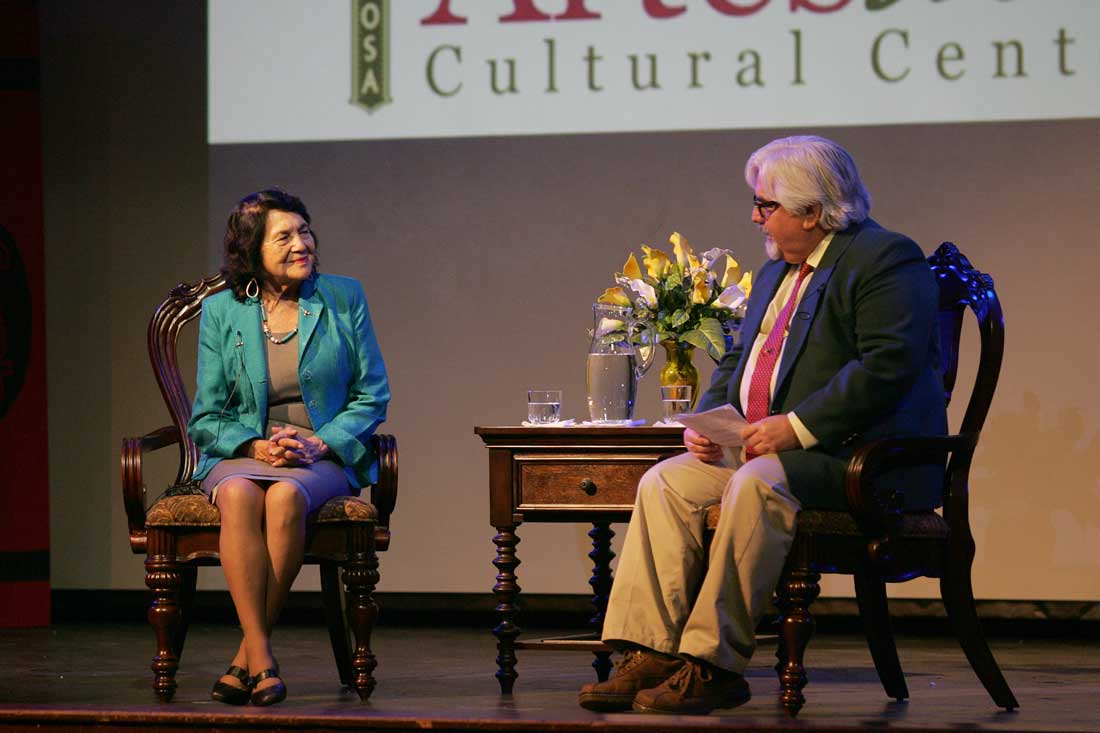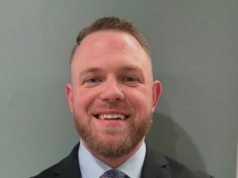She’s been jeered, arrested, beaten, smeared. She’s on just about every website devoted to ferreting out socialists and Communists in our midst. She’s also been feted, cheered, and given the Presidential Medal of Freedom. Six schools in three states are named after her. Dolores Huerta has been on the front lines of the social justice movement since 1955, and at 84, she has no intention of stepping aside.
“The fight for social justice, for women’s rights, for the rights of the people who grow our food and work with their hands is not over yet,” she told Fort Worth Weekly.
Huerta stopped in Fort Worth last week to speak to a packed house at the Artes de La Rosa Cultural Center and to visit her namesake school here — Dolores Huerta Elementary School in north Fort Worth .
Hundreds of school kids sat on the gymnasium floor, and teachers and parents lined the walls shoulder to shoulder. A middle school mariachi band entertained the crowd, followed by an elementary school group singing Claro Que Se Puede — “It’s clear that we can.” The song uses Huerta’s trademark call to unity: Si, se puede! —yes, we can!
Except for the small, bright-eyed guest of honor sitting quietly onstage in a green jacket over a gray dress, it was a typical end-of-school-year program. Most of the kids probably didn’t know who she was or why she was there. The lady was their excuse to be out of class, and that was enough.
Most certainly didn’t know they were listening to one of the most reviled and revered — depending on where you stand — women of the last half-century, a firebrand and tireless advocate for the working class, particularly farmworkers and Latina women. Among her many achievements is the co-founding, with Cesar Chavez, of what is now the United Farm Workers union.
For the kids sitting on the gym floor, Huerta gave a personal version of the mantra she’s preached for almost 60 years.
“We know that someday we can make a world where farmworkers will not go hungry, where restaurant workers will not go hungry, the janitors who clean your schools do not go hungry,” she told them. “But that world will not happen unless we work together. One person alone cannot make it happen. Together, si, se puede!”
Afterward, talking to the Weekly about her life and career, she was warm, direct, and charismatic. Huerta was born in 1930 in Dawson, N.M. Her father was a miner, union activist, and field worker; her mother owned a hotel where she rented rooms to migrant workers. When the couple split up, 3-year-old Dolores and her two brothers moved with their mom to Stockton, Calif., where Huerta attended high school and college at the University of the Pacific’s Stockton College — which was tuition-free at the time — and earned a provisional teacher’s license.
“I was a young mother” (she eventually had 11 children) “teaching grammar school. But it struck me that I could do more. I couldn’t bear to watch the kids come to school hungry and without shoes. I thought I could do more fighting for them than teaching them,” she said.
In 1955 she formed a chapter of the Community Service Organization, a grassroots group aimed at empowering Mexican-Americans through voter drives, citizenship workshops, legislation, and most importantly, by creating an awareness that while a single person might be powerless, a group of such people can be formidable.
“That’s been a driving force in my work: Alone, we can do nothing; together we can do anything,” she said.
Together, Chavez and Huerta — who earned the moniker Dragon Lady despite her small stature, for her fierce determination in the face of long odds — co-founded the National Farm Workers Association in 1962, which a few years later became the UFW. Among the group’s accomplishments was securing disability insurance for farmworkers.
That same year, the UFW took up the cause of Filipino grape pickers in California who’d gone on strike for better living and working conditions, with the UFW workers striking alongside them. Huerta went further and pushed Chavez to use the local strike as the basis for a national boycott of all California table grapes. The Delano Grape Strike, as it was known, lasted five years. In 1970, feeling the financial pressure, grape producers sat down with the UFW and agreed to their first union contract, which improved workers’ pay, conditions, and benefits.
While the strike and boycott got Huerta arrested several times, she also gained significant political influence: She was with Robert F. Kennedy in 1968 when he was fatally shot after winning California’s Democratic presidential primary.
Following the success of the grape boycott, Huerta began organizing migrant labor elsewhere. She also began pushing people to vote. “The legal Latino community is large enough to move elections, but they won’t if they don’t vote,” she said.
In 1972 she joined Jane Fonda and Bella Abzug in the famous anti-war action, the “Ring Around Congress,” in which women and children linked arms around the U.S. Capitol building. In 1973 she and Chavez started a lettuce boycott that was instrumental in establishing the right of collective bargaining for California agricultural workers.
Her work made a lot of people mad. “They wondered who the heck I thought I was. Well, I thought I was someone willing to fight for people, who knew how to organize people, who could teach people the power they have in themselves,” she said.
She was arrested nearly two dozen times. At 58, as she protested presidential nominee George H.W. Bush, a San Francisco policeman hit her so hard that he ruptured her spleen and broke several ribs. Only emergency surgery saved her life.
Asked if she felt like giving up then or later, she smiled. “If you give up, you lose,” she said. “Even when times are hard, we keep going forward. Then you win.”
After recuperating, Huerta turned her sights toward getting more Latina women elected to political office. State Rep. Ana Hernandez of Houston said Huerta made a huge difference.
“Her work opened doors for many of us,” she said. “Dolores Huerta was instrumental in making so much possible for Latinas in politics.”
In 2002 Huerta started her namesake foundation, devoted to developing grassroots organizations to fight for education, healthcare, and women’s rights. “More money for schools and less for prisons would be a good place to start,” she said.
“I’m not satisfied with where we are,” she said, explaining what keeps her going. “My foundation went door-to-door in California telling people about the benefits of Obamacare, getting people to sign up. So many people are afraid because of the lies they’ve heard on television. We’ve got to make sure they know the truth.”
She’ll never quit, she said, “not as long as I’m strong; there are still things to fix.”













I respected what she stood for up to the point she supported and pushed odumbocare.
The most ruinous fraud ever forced on the American people.
Communist. Why can’t these folk understand that freedom REQUIRES personal responsibility and independence. You cannot have both freedom and security from hunger or any other ill aspect of our lives.
If you’re working hard every day and still aren’t paid enough to feed yourself and your family, how is wanting enough money to feed yourself and your family being not independent and responsible and communistic?
It’s the Fascists (er, Republicans) who don’t care that people work hard and still don’t make enough to feed themselves and their families.
You are funny.
God forgive you.
Loyd: I’ve heard a lot of bad things about the ACA, aka, Obamacare. What I don’t understand is this: The passage of the ACA guarantees everyone in the country with insurance, not those who signed up, but everyone, now has an insurance company that has to prove it’s spending 80 percent of its money on actual health care, not dividends, salaries, advertisements, etc.
No insurance company, whether you have it on your own, through your company, via Obamacare, can turn you down any longer for pre-existing conditions.
No insurance company, whether you have it on your own, through your company, through Obamacare or any other way, can now tell you you’ve used up your lifetime amount of insurance.
All kids, regardless of how their parents happen to have insurance, can now stay on their parents insurance until they are 26 years old.
In other words, there have been four major, unprecedented changes in how medical insurance is provided to everyone in the United States who has insurance, regardless of how they happen to have it–all four of which are benefits that cost nothing to the consumer.
What is the complaint? Loyd, you won. You’re now a winner. You were able to complain about Obumacare and still came out a winner. What’s the darned issue? Why are people so angry about getting a better deal? I’ve been trying to figure it out for five years and still can’t see the argument against it.